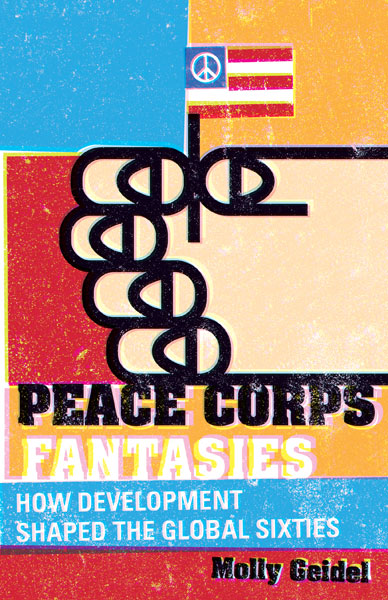New Academic Book Slams The Peace Corps

We have recently received review copies of Molly Geidel new book on the Peace Corps published by the University of Minnesota Press. Within the next month or so we will be reviewing the book as well as interviewing the author. Molly Geidel is from southern Vermont. She received her BA from Brown, her masters from UMass in Boston, and her PhD from Boston University. This book is a revised version of her PhD dissertation. Dr. Geidel taught briefly at Harvard and Cornell and moved to the UK this fall where she is an assistant professor in American studies at the University of Manchester.
Molly’s argues the case in her book that while in the “popular imagination of the United States to this day, it [Peace Corps] is a symbol of selfless altruism and the most successful program of John F. Kennedy’s presidency,”….in reality the “agency’s representative development ventures also legitimated the violent exercise of American power around the world and the destruction of indigenous ways of life.”
Molly goes onto write that in the 1960s, the practice of development work, embodied by “iconic Peace Corps Volunteers,” allowed U.S. policy makers to “manage global inequality while assuaging their own gendered anxieties about postwar affluence.”
(Gee, I thought I was just teaching sophomore English in Addis Ababa.)
Geidel has done her homework. There are forty + pages of Notes at the end of her 238 page book. It appears that her central thrust is focus on the PCVs of Bolivia and it also appears to be the only Peace Corps country she visited.
One line in her Introduction jumped out at me. She writes, “To put it another way, doesn’t development actually help people? In response, I would say of course, sometimes.”
Much more later on this website about Peace Corps Fantasies: How Development Shaped the Global Sixties.

- Dr. Molly Geidel
I’m sure Molly never spoke with the 100 or so 9th grade students I taught in Asmara or the equal number in my classes in Addis. Nor did she hear Harris Woffard tell us at our UCLA training site to “love” our Ethiopian hosts.
As I recall, most of us in the Ethiopia 7 program, having graduated college in 1966, were actually pretty radicalized politically, and would have been alert and sensitive to any effort on the part of Washington to accomplish what Molly suggests.
She’s delusional to think Washington operates like such a well-oiled machine with so many diverse, moving parts (corporate, military, humanitarian) neatly controlled by a central authority for some nefarious purpose. Molly’s literary talents are more suited to sci-fi than non fiction. David
I wish that you all would read the book. There is much to comment and review. I was able to get the book on interlibrary loan with a few days. I would suggest that others do that, also.To comment on the book without reading it, is not helpful.
Also, gentlemen, if male RPCVs feel free to comment on a book written by a female professor without reading the book, it tends to reinforce a theme of male arrogance in the early Peace Corps, towards women, both PCVs and host country,
If Molly can write about something she never experienced, I can comment about a book I’ve never read.
You, of course, David, can do whatever you want do. However, what is it you feel is the baseline of “experience” for a woman to write a book? How is it you can comment on a book you have never read?
Please know, I have many criticisms of Dr, Geidel’s book. I do not feel it is necessary for me to defend her. I do not want this important discussion to dissolve into a playground spat between the girls and the boys. I just think that you should know that as I read the first part of her book she suggests that the idea of Peace Corps was to help restore the “flagging” masculinity of young American men. I really should not try to paraphrase what Dr. Geidel says, but I do want to suggest that you might find reading that part of her book enlightening.
You absolutely annihilated David, gg. Sister are doing it for themselves
It would be really helpful to know who gg is and who One of the Sisters is. I find it very interesting that Professor Kallman, author of the “Peace Corps and the death of Idealism” worked for a NGO in Bolivia developing co-ops. Her book was reviewed here and also her interview with John Coyne. I wonder if Kallman ever read “Peace Corps Fantasties”. Kallman had extensive end notes in her book, but no bibliography.